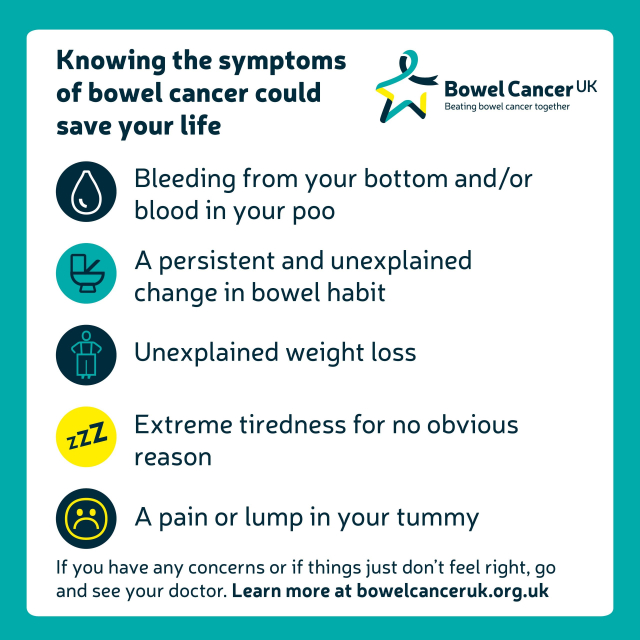What is bowel cancer?
Bowel cancer is cancer that starts in the large bowel. It happens when abnormal cells divide and grow in an uncontrolled way.
The bowel is split into two parts: the small bowel and the large bowel. The large bowel includes the colon, back passage (rectum) and the bowel opening (anus).
Depending on where it starts, bowel cancer is sometimes called colon or rectal cancer.


Who does bowel cancer affect?
Bowel cancer is the fourth most common cancer in the UK. Most people who get it are over the age of 50 and nearly 60% of cases are in people aged 70 or over. But bowel cancer can affect anyone of any age.
Screening for bowel cancer can save lives, as it is treatable and curable especially if caught early. Around 90% of people with stage 1 bowel cancer will survive their cancer for five years or more after they are diagnosed.
Signs and symptoms of bowel cancer
Signs and symptoms:
- A persistent change in bowel habit – going more often, with looser, runnier stools and sometimes tummy (abdominal) pain.
- Blood in the stools without other symptoms of piles (haemorrhoids) – this makes it unlikely the cause is haemorrhoids.
- Abdominal pain, discomfort or bloating always brought on by eating – sometimes resulting in a reduction in the amount of food eaten and weight loss.


In some cases, bowel cancer can stop digestive waste passing through the bowel. This is known as a bowel obstruction.
Symptoms of a bowel obstruction can include:
- Intermittent, and occasionally severe, abdominal pain – this is always bought on by eating.
- Unintentional weight loss – with persistent abdominal pain.
- Constant swelling of the tummy – with abdominal pain.
- Being sick – with constant abdominal swelling.
A bowel obstruction is a medical emergency. If you suspect your bowel is obstructed, go to the accident and emergency (A&E) department of your nearest hospital.
For more information from the NHS on symptoms of bowel cancer click the link below.
Further Information
For more information on bowel cancer from the NHS click the link below.






